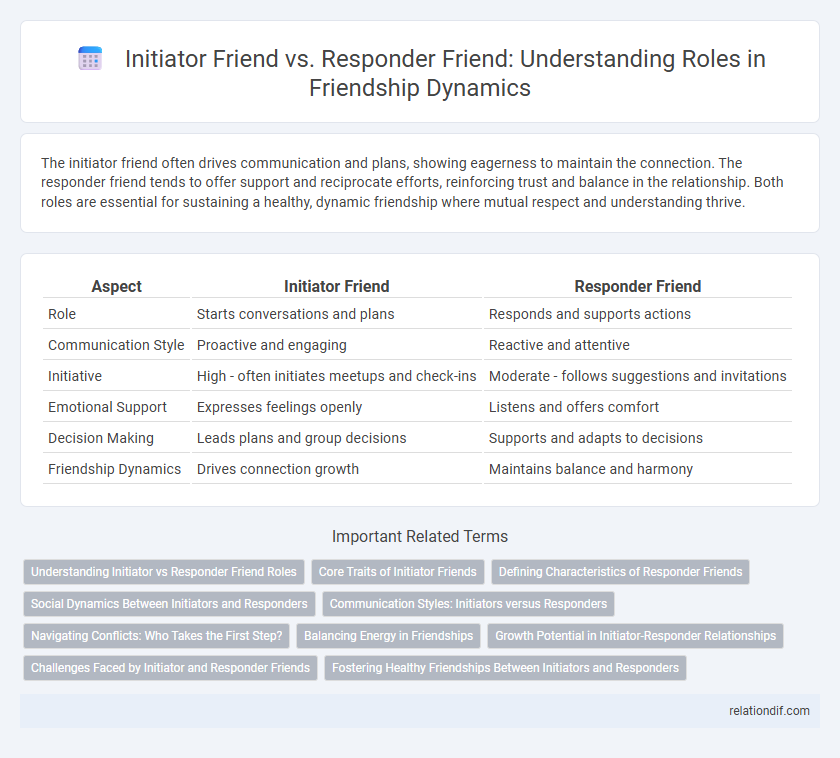The initiator friend often drives communication and plans, showing eagerness to maintain the connection. The responder friend tends to offer support and reciprocate efforts, reinforcing trust and balance in the relationship. Both roles are essential for sustaining a healthy, dynamic friendship where mutual respect and understanding thrive.
Table of Comparison
| Aspect | Initiator Friend | Responder Friend |
|---|---|---|
| Role | Starts conversations and plans | Responds and supports actions |
| Communication Style | Proactive and engaging | Reactive and attentive |
| Initiative | High - often initiates meetups and check-ins | Moderate - follows suggestions and invitations |
| Emotional Support | Expresses feelings openly | Listens and offers comfort |
| Decision Making | Leads plans and group decisions | Supports and adapts to decisions |
| Friendship Dynamics | Drives connection growth | Maintains balance and harmony |
Understanding Initiator vs Responder Friend Roles
The initiator friend takes the lead in starting conversations, planning activities, and expressing needs, driving the friendship forward through proactive engagement. The responder friend primarily reacts to these efforts, offering support, feedback, and companionship, ensuring balance and reciprocity in the relationship. Understanding these roles helps clarify communication dynamics and fosters mutual appreciation within the friendship.
Core Traits of Initiator Friends
Initiator friends exhibit proactive communication, consistently reaching out to maintain and strengthen connections through calls, messages, or plans. Their core traits include reliability, enthusiasm, and a genuine interest in others' well-being, which fosters trust and deepens the friendship bond. This proactive nature often motivates reciprocal engagement, encouraging responder friends to contribute actively to the relationship.
Defining Characteristics of Responder Friends
Responder friends exhibit qualities of active listening and empathy, prioritizing understanding and validating the initiator's feelings. Their defining characteristic lies in their attentiveness and emotional support, responding thoughtfully rather than dominating conversations. Such friends foster trust through consistent responsiveness and balanced reciprocity in the friendship dynamic.
Social Dynamics Between Initiators and Responders
Initiator friends often shape the frequency and depth of social interactions by proactively reaching out and organizing activities, establishing a dynamic where responders react and adapt to the initiator's cues. Responders play a crucial role by providing feedback and emotional support, influencing the initiator's behavior and reinforcing mutual trust within the friendship. The balance between initiator and responder roles impacts the overall quality and sustainability of social bonds, with effective communication and reciprocity enhancing connection strength.
Communication Styles: Initiators versus Responders
Initiator friends often exhibit proactive communication styles, frequently starting conversations and introducing new topics, which demonstrates leadership and enthusiasm in social interactions. Responder friends typically engage through reactive communication, providing thoughtful feedback and support that fosters deeper understanding and trust within the friendship. Recognizing these complementary communication patterns enhances mutual respect and strengthens relational dynamics between initiators and responders.
Navigating Conflicts: Who Takes the First Step?
Initiator friends often take the first step in resolving conflicts by expressing feelings and seeking dialogue, setting the tone for reconciliation. Responder friends play a crucial role by acknowledging the initiator's outreach with empathy and openness, fostering mutual understanding. Effective conflict navigation relies on both parties balancing initiative and responsiveness to restore trust and maintain a healthy friendship dynamic.
Balancing Energy in Friendships
Initiator friends often invest more effort in starting conversations and planning activities, which can create an imbalance if responder friends rarely reciprocate. Balancing energy in friendships requires mutual participation, where both initiator and responder share responsibility for maintaining connection and engagement. Equitable exchange fosters sustainable relationships, preventing burnout and promoting deeper emotional support.
Growth Potential in Initiator-Responder Relationships
Initiator friends often drive the growth potential in relationships by actively seeking connection and fostering deeper communication, which encourages responder friends to engage more meaningfully. Responder friends contribute by providing feedback, emotional support, and reciprocal effort, enhancing trust and mutual understanding. The dynamic interplay between initiator and responder roles cultivates a balanced friendship that promotes continuous personal and relational development.
Challenges Faced by Initiator and Responder Friends
Initiator friends often face challenges such as the pressure to maintain consistent communication and the vulnerability of expressing feelings first, which can lead to uncertainty about reciprocity. Responder friends may struggle with balancing timely and genuine responses while managing personal boundaries and the risk of misinterpreting the initiator's intentions. Both roles require navigating emotional labor and expectations that significantly impact the dynamics and sustainability of the friendship.
Fostering Healthy Friendships Between Initiators and Responders
Initiator friends often take the lead in starting conversations and planning activities, while responder friends contribute by providing thoughtful reactions and support. Balancing the dynamics between initiators and responders fosters mutual respect and effective communication, ensuring both feel valued and understood. Establishing clear boundaries and nurturing empathy enhances trust, creating a healthy foundation for long-lasting friendships.
Initiator friend vs Responder friend Infographic

 relationdif.com
relationdif.com